The Sweetest Dark Read online
Page 2
There was no one accompanying me to offer any lies about returning to the city soon. I’d left the foundling house alone, astonished enough that they’d paid for the hansom cab to get me to the station. It would have been a very long walk.
I turned my gaze to the ceiling once more, inhaling the scent of damp wool and biscuits and tea, watching the billowing steam from the trains wind upward in corkscrews, condense into rows of silvery tears strung along the steel ribs.
Then I moved past Bobby and his mum, shouldering my way through the crowds to the train that would take me away from this place.
What with the dismally methodical determination of the Germans to blow us all to smithereens, it seemed a strange miracle none of the glass above me had yet cracked.
• • •
“Ticket, luv?”
The ticket agent stood over me, his gloved hand flat out in front of my nose. I’d been daydreaming, gazing out the window at the last looming shadows of the city whipping by. With my eyes half closed, with my breath clouding the pane, the outlying dregs of London became one long, lovely smear of mist.
The agent startled me out of my reverie; my head jerked back and my hat mashed against my seat.
“Er—sorry—”
“Righto,” he said cheerfully enough, but his hand didn’t move.
Ticket, ticket—I straightened my hat and patted my empty coat pockets. Where had it gone? I’d begun to run both hands rather desperately down my skirt before I recalled I’d stuck it in the suitcase at my feet.
I bent over to snap open my case. The stout woman crammed next to me shifted irritably. The third-class compartments had rows of narrow wooden benches and too many passengers and precious little else. My bench mate had been pushing her boot against my bag for the last half hour, as if she could shove it through the wall of the train to get it out of her way.
She reeked of days-old sweat and chickens. I wished I could shove her out of the train.
“All the way to Wessex, then?” the agent inquired, still jovial, his hand punch biting holes in my ticket with a series of rapid click-click-clicks.
I nodded.
He cocked his head and gave me a dubious squint. “Land Girl, izzit?”
I knew I looked young; I was small and angular in all the wrong places, something the too-tight coat seemed to emphasize. But the Land Girls, those strapping city girls headed out to England’s farms to finish the work all our fighting young men could not do, were usually at least eighteen. However old I actually was, I knew I was nowhere near that.
“School,” I said, and the man’s face cleared. He gave me back my ticket.
“Aye. Wessex, then. Good luck, luv.”
“Thank you.”
He walked on. As the train rocked back and forth, the chicken-woman began to brush at the wrinkles in her dress, using the movement as an excuse to force me harder to the wall. She spread her legs and jammed her foot up against my case again.
I had not grown up in the halls of Blisshaven for nothing. I freed my own foot and kicked down against her instep. For someone my size, I was surprisingly strong.
“Oh, I’m awfully sorry,” I said sweetly, meeting her outraged look. “Was that your foot? I had no idea. It’s so dreadfully tight in here, don’t you agree? I swear, I can hardly breathe.”
I had to do that twice more before she got up and left.
• • •
The hours crept by. As the sky beyond my window grew glummer and darker and the stops more frequent, the train began to empty. Around four I rummaged in my case and found the meal that had been packed for me back at the Home: an apple, a thick slice of buttered bread, and an actual, amazing seared pork sausage.
The Home had never been overly generous with food, and meat was already becoming scarce. I stared down at the sausage in its waxed-paper packet, genuinely shocked that someone in the kitchens had thought to give it to me. Perhaps it was meant as a final farewell.
The air raids were taking their toll, and the government had recommended sending as many children out of London as possible. Blisshaven itself had been hit nearly right off. No one had been killed, but the entire northern section, a decrepit labyrinth of leaky pipes and peeling paint that had served as our schooling arena, was now rubble. Most of us considered it an improvement.
So the Home had been emptied. I was, in fact, the very last orphan to leave, and I knew this was not because I was the eldest or the youngest or the least or most attractive, or any of the other rumored criteria that had been whispered about the dormitory in the days after the hit.
I knew I was the last because I was tainted. I had been sent to Moor Gate.
All the other wards had been scattered to the four corners of the kingdom, sent to whichever other foundling homes had room to take in more of the unwanted.
But for me. I hadn’t been assigned to another orphanage.
“The Iverson School for Girls,” Mr. H. W. Forrester had informed me, examining me like a nearsighted owl from over the tops of his spectacles. “It enjoys a sterling reputation. You are fortunate indeed they had an unexpected opening for a new charity student.”
“Yes, sir,” I had replied. I had been summoned to the hallowed office of the director, seated with well-mannered precision at the edge of the chair before his desk. The room was cramped with bookcases and cabinets and the lace curtains behind him were caked with dust; it was a little surprising more of it hadn’t flaked off from the air strikes.
Mr. H. W. Forrester had fleshy jowls and salt-and-pepper hair greased with pomade and veiny, restless fingers that tended to tap across the scattered sheets of paper before him. I was very careful never to look even once at the diamond stickpin in his tie.
“It’s on the southern coast, set near Idylling. Seat of the dukes of Idylling. The Louis family, you know.”
“Oh,” I said.
“Lovely area. I myself spent a holiday there once.” He leaned back in his chair, his gaze taking on a faraway cast. “Sandy beaches. Balmy breezes. One may sea-bathe in utter comfort.…”
I counted silently to twenty, then cleared my throat. “What happened to her, sir?”
Mr. Forrester lowered his gaze back to me. “To whom?”
“To the other girl? The one who left the opening for a new student?”
“Why, I’m certain nothing happened to her, Eleanore. Really, what a question. I trust you will manage to curb that macabre bent of yours once at Iverson. You won’t make many friends that way.”
“No, sir,” I agreed, and pressed my lips shut.
London wasn’t the only part of the country being attacked. The dailies were full of articles about how the Germans were beginning to bomb the coasts, as well, as far as they could go in their massive zeppelin airships.
Wessex. I’d bet the sterling school of Iverson had found itself with a sudden slew of student openings.
“The headmistress, Mrs. Westcliffe, has been made aware of your particular … personal history and has decided to take you in anyway. Provisionally, I might add. The duke himself sponsors the school, you know, and has granted it a very generous endowment for a select few impoverished students. You are an extremely lucky young woman, Eleanore.”
“Yes, sir.”
“I expect you to make the most of this opportunity.”
“I shall, sir.”
“Indeed. Not many patients from Moor Gate will ever be offered such a reprieve. You must always remember them and your months spent there. Strive to succeed for their sakes, as well as your own.”
I wondered, very seriously, if Mr. H. W. Forrester had ever noticed the curtain cord hanging down the wall just behind him or considered how easy it might be to wrap it around and around his neck.
He leaned forward again, his jowls swelling over his collar, and frowned at me with his owlish disapproval. The diamond securing his tie flared.
“You seem much improved from your first years here, child, but do not give me reason to regret this arrangemen
t. Obey the headmistress without question, and fulfill all your duties to the duke and to the school.”
“Yes, sir.”
He frowned at me for a moment more, then sighed. “That will be all, Miss Jones.”
And it was. That had been my last evening in the Home.
Idylling, Iverson, dukes and bombs and sea-bathing …
I didn’t care if the Huns shelled it every night, if the duke wanted me to dance a jig for my suppers, or if the school itself was situated smack in the middle of the South Pole. It would be better than Blisshaven, I told myself, savoring each chewy bite of that cold sausage on the train. Better than Moor Gate.
Better than anything, really. How could it not be?
Of course, that last, hopeful thought occurred to me only hours before I would meet Jesse and Armand, those two savagely different and yet dangerously similar creatures who were destined to dig their talons into me and change my life forever.
Chapter 3
Mine was the final stop of the line. By then there were only two of us left in the compartment, me and a slouched, elderly man with a tweed cap pulled down low over his ears, a cane and valise propped by his feet. He’d been snoring for the past two hours, even through the lurching stops and starts.
Beyond the glass of my window the night was now amethyst. Infinite amethyst, deep and dark with a ripple of stars winking over the obsidian break of the forest paralleling the tracks. I found that depth of purple sky mesmerizing. Nights in the city were always gray or black or the color of the streetlights. Always. So I wasn’t sure why this particular hue—those stars, the jagged line of trees—was so familiar. I must have imagined it this way, I decided. I read so much. I must have read of amethyst nights and imagined it.
“Bournemouth, end o’ the line,” called the stationmaster from past my window, clumping along the wooden platform as the train hissed to a halt.
I stood, stretching the ache from my shoulders, and found my suitcase. A glance back at the snoring man showed he was already up and shuffling out, so I followed him, my case bumping against my knees.
A waft of damp air hit me as I exited, stirring the loose strands of hair that had pulled free of my chignon. It wasn’t balmy precisely. It was April, so it wouldn’t be, even here. But it carried the promise of warmth, smelling strongly of the salty channel and of the coming summer that only waited to bloom.
I took it in with wonder. I could taste the sea, I realized. I could taste it.
“Last stop, miss,” barked the stationmaster, now paused before me. “Everyone off. Even little girls, eh?”
I had lingered too long on the steps leading down to the platform. In my chagrin, I jumped over the last two rungs, landing smartly on both feet, but the man was already pacing off.
I walked slowly away from the train, looking around the platform.
Someone was supposed to meet me. Director Forrester hadn’t known who, but he had been reasonably certain—those had been his exact words, reasonably certain, mumbling to himself as he’d ruffled through all the papers on his desk, because surely they could not expect you to find it on your own, no, indeed; I cannot seem to locate the telegram that says so, but—that someone from the school would meet me here and take me on the rest of the way to Iverson, which apparently involved traveling by foot and carriage and maybe even a ferry. I was as unclear on the exact location of the school as the director had been.
I prayed he was right, that someone would come. I didn’t have enough money left for another cab.
But … the station itself seemed closed, its curtains shut, its windows dark. That by itself wasn’t too surprising; in London the streetlamps were extinguished at six and windows were papered in black to block any little leaks of light. No one wanted to guide the Germans’ nighttime bombs. Yet the train station’s windows weren’t papered. There was simply no one left inside to turn on the lights.
I did hear music playing from somewhere, lovely and haunting, muted. Perhaps the stationmaster had left on a phonograph in his office.
The platform was virtually empty. There was no one at all to my left, toward the end of the train, and only a pair of porters unloading a stack of luggage far up by the front, near the first-class compartments, threading in and out of a single pool of light cast from a lamppost nearby.
The stationmaster had aimed their way. After a few more minutes of glancing nervously around the deserted platform, I did the same.
Before I’d gotten far, a new cluster of people approached the growing wall of trunks. There were four of them plus the stationmaster, their hats and shoulders stroked with gold from above. One of the newcomers was a man of about forty in a long taupe coat. The other three were younger people more my age, two boys and a girl.
Or not quite my age, I amended to myself, as the nearest of the boys noticed my approach. They were all taller, probably a few years older. And much, much better dressed than I.
The boy who’d seen me had sandy hair and heavy-lidded hazel eyes; they looked me up and down without interest before he turned his attention back to his companions.
“… to Idylling,” the second boy was saying to the long-coated man. “Is it really just you, George? I mean, look at all this. Chloe alone brought enough trunks to fill three autos.”
“Armand!” protested the girl, with a sort of trilling little laugh. “Honestly!”
“Not to mention Laurence’s and mine,” the boy went on, speaking over her. “No, there’s no hope for it. There’s not room for all of us. We’ll have to motor there without you.”
“My lord, I don’t believe His Grace will—”
“Right, well, what Reginald doesn’t know won’t hurt the rest of us, will it, old chap? I’ll send Thomas back for you with the auto as soon as I can. You can wait here with the baggage.”
“Sir,” broke in the stationmaster from behind them, just outside their ring of light. The other four angled as one to see him, still brushed in buttery gold. The stationmaster rocked back on his heels. “We closed for the night five minutes past, sir.”
“Ah,” said the second boy. He had longish chestnut hair that touched the top of his starched collar; much of his face was obscured by the brim of his hat, but I saw him tug at his lower lip in thought. Even to me, it looked utterly contrived. “I see. Perhaps, though, you might make an exception tonight? For the duke?”
“The duke, sir?”
“Well, the duke’s son,” said the hazel-eyed boy, sounding impatient. “Lord Armand, of course.”
“Station closes at ten sharp,” said the stationmaster. “Rules, sir.”
“Now, really,” began the boy named Laurence, and in his clipped voice he was speaking very quickly, but curiously enough I no longer heard what he was saying, because just then the other one—the Duke of Idylling’s son himself, I supposed—had caught sight of me hanging back in the shadows.
He had been reaching into his inner coat pocket for something. I saw dimly and without surprise that it was a wallet, and while still holding it he pushed up his hat, staring at me intently. His skin was pale as ivory, his eyes were blue and heavily lashed, quite as striking as a girl’s.
The line of his lips began to flatten into an expression that might have been pain or irritation or perhaps pure distaste.
“Who are you?” he demanded.
Laurence and the stationmaster, who had been working themselves into an actual argument, fell silent. The trilling girl leaned past the duke’s son to get a better look at me, the lace wrap around her neck and shoulders prickled with light. She was as stunning as I’d expected, dark hair, dark eyes, a rosebud mouth puffed into a pout. An overripe scent of jasmine and sugar surrounded her like a cloud.
“Oh, Mandy, do send her off,” I heard her plead under her breath. “Tell her we haven’t any pennies to spare.”
I spoke to the dark-haired lord. “I’m going to Iverson. To the school. Can you give me a lift?”
Laurence snorted and the girl looked truly appa
lled, but Lord Armand only stared at me harder.
“What’s your name?”
“Eleanore.”
This bit of information didn’t seem to satisfy him. He took off his hat with his free hand, and for one wild and unlikely moment I thought he was going to offer me a bow, but instead he pushed his fingers through the shiny brown hair that had been mashed to his forehead.
“I haven’t got a trunk,” I said into the silence. “Only this.” I tapped the toe of my shoe against my suitcase. “So I won’t take up much room.”
Chloe raised a hand to her mouth; her snicker was still loud enough to hear.
Yet I held on to that steady blue gaze. From the cut of his clothes to the angle of his chin, Lord Armand of Idylling was every inch an aristocrat and no doubt used to people of my class scraping low whenever he passed by. I wasn’t going to be one of them. There was something about this young man, some indefinable thing that felt like—like a living snake poised taut between us. A real, electric, dangerous thing, and if I dropped my gaze, it would turn on me, and I would lose more than just this moment.
“How about it?” I said, trying to sound confident but instead managing something barely above a whisper.
The pressed shape of his lips began to loosen. He opened his mouth, maybe to speak, but before he could, a new voice chimed in.
“No need, m’lord.”
I didn’t have to look away first; Lord Armand did. His gaze cut to someone behind me.
“Hastings,” greeted the boy, strangely flat, and when I turned around fully I saw that the new person who’d spoken was my fellow passenger from the train, the snoring old man, standing now motionless beneath the awning of the station roof. “How … nice to see you again.”
“Aye. I’m here for the gel.” The man curled an arm toward me. “Come along, miss. Haven’t got all night.”
I flicked a last glance at Armand, who was scowling faintly. None of the others were looking at me at all.

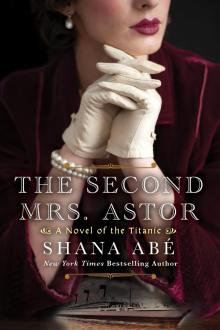 The Second Mrs. Astor
The Second Mrs. Astor The Treasure Keeper
The Treasure Keeper The Deepest Night
The Deepest Night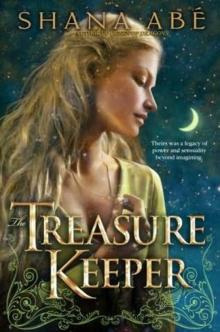 The Treasure Keeper d-4
The Treasure Keeper d-4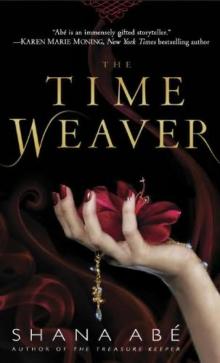 The Time Weaver d-5
The Time Weaver d-5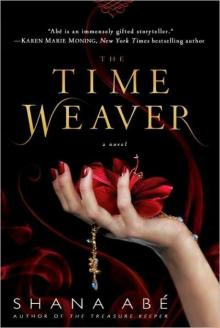 The Time Weaver
The Time Weaver The Smoke Thief
The Smoke Thief The Sweetest Dark
The Sweetest Dark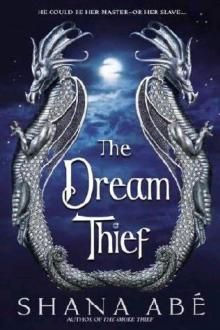 The Dream Thief
The Dream Thief The Deepest Night tsd-2
The Deepest Night tsd-2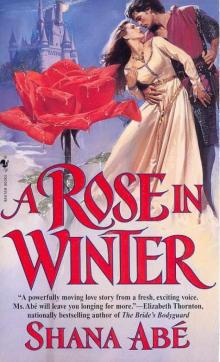 A Rose in Winter
A Rose in Winter Queen of Dragons d-3
Queen of Dragons d-3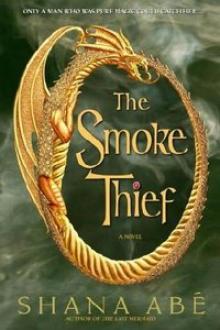 The Smoke Thief d-1
The Smoke Thief d-1